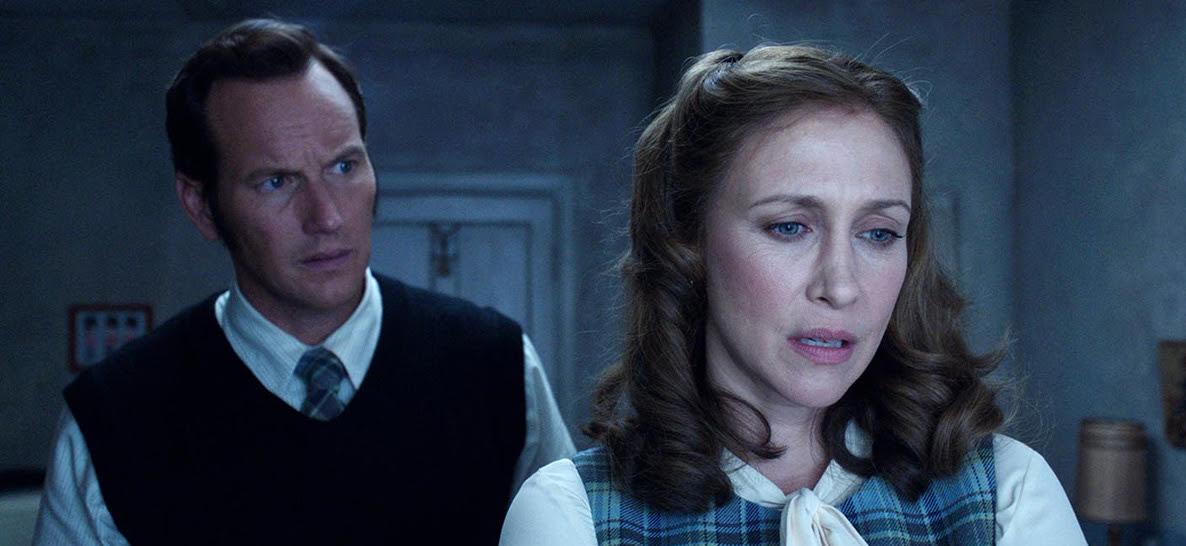
The sequel to the critically acclaimed film, The Conjuring, officially releases today. Like the first, The Conjuring 2 follows Lorraine and Ed Warren, a married couple who are also paranormal investigators. This time, viewers find them in north London, where a single mother of four children has reached out to them for help. Her house, we find out, is possessed by demonic forces.
Aside from their surprisingly developed characters and storylines, the Conjuring films stand out for another reason: They’re written by brothers who are committed Christians.
Earlier this week I talked with Chad Hayes and Carey Hayes about their new film, the place of the demonic in pop culture and how two kids from a family of pastors and missionaries end up writing horror films.
Like the The Conjuring, this new movie is based on a real-life couple, Lorraine and Ed Warren. What drew you to their story?
Chad: When we did the first film, we loved the idea of telling these kind of stories through the point of view of people who had truly experienced something in their life. It gave us a kind of franchise—which, we knew if it was successful, we could continue to tell stories and build on their characters.
Ed and Lorraine have been doing [paranormal investigation] for so long, and the idea of good conquering evil is always a great theme in a movie.
It’s such a pleasure having gotten to know Lorraine over the years, and to have her share her personal experiences. The fact they have had some demonic interaction and had to deal with stuff like that, it just felt so honest and truthful.
It was just challenging and fun and we felt creatively inspired—because a lot of this can be double-checked online. Like with the Hodgin family: You can go online and check out the levitation, the size of the story, the scope of the story, when the Warrens were involved.
Demonic possession is having a cultural moment right now—The Exorcist is getting TV show, Preacher. Why do you think that is?
Carey: I think that social media has really exploded the ability to look at somebody else’s experiences firsthand. You’re having the Vatican announcing that they’re training more exorcists, and [the demonic] is becoming more prevalent in our consciousness today. I think that awareness is heightened because of a deep-rooted curiosity. Because you either believe or you don’t, and those who do believe are slowly able to convince those who don’t believe [through social media].
Chad: I find it so interesting because, if you think about it, The Conjuring came in second as the highest grossing genre film ever. And the first one was The Exorcist. So here we have a possession story followed second by another possession story. So it makes me feel like the interest there, the interest is worldwide. These stories cross over into virtually every religion with good versus evil.
Obviously your movies are dark, and they deal with some really scary things. But there is good at work. How do you go about these “redemptive” themes in your films, especially in a genre that hasn’t always been known for that?
Carey: We always back into these stories because we always want to know when we’re doing research how it ends. And then, we always pull back and go, “OK, if Ed and Lorraine are going to go through this journey, what are they going to get out of this?” What does this reflect to them outside of the spiritual world? What does it reflect on a personal level? And what does it exemplify to others?
Their vows of marriage are so strong and these two are so in love, that you want to see them succeed. But what happens when that obstacle, that essence of evil, starts creating those fissures or those wedges and how does that affect them? I think the forefront of our stories need to be really character-driven. Because if you don’t care about the characters, you don’t care about the movies.
Chad: We love the idea of happy endings in these movies. They’re still scary. They’re still truthful. But to have a movie that’s rated R that has no sex, no swearing, no blood, is unheard of. So people out there that might pre-judge and say, “Oh I don’t want to support horror movies. They’re about darkness and the Devil and all that.” Well, this is about beating the Devil and this is about family and love.
You’re really open about both being believers. Did you grow up in a Christian home?
Chad: Very much, yes we did. We grew up around cousins and aunts and uncles being missionaries and pastors and ministers.
We had a very blessed upbringing, with very strong parents who are still married today (both in their 80s). Just a great family. We’ve got an older sister and a younger brother and we grew up in one of those families where every Sunday we sat down and we had family dinner and Sundays were family days and you didn’t plan anything. So it was a great experience.
The movie The Reaping was actually loosely based on an aunt who had become a missionary in India and had served 10 years there.
How did you two go from a family of missionaries and preachers to horror film writers?
Carey: Chad and I were involved in television and wanted to start writing features. We were introduced to (producer) Joel Silver at Warner’s Brothers, and they owned the title House of Wax. They said, “Hey, you guys, we’re looking for writers with ideas.” And Chad and I said, “Well, we have a great idea.” And we did and it just fast tracked us and they put it into production right away.
And that’s how we became horror writers. Everybody goes “Oh boy what’s your next horror movie?”





















